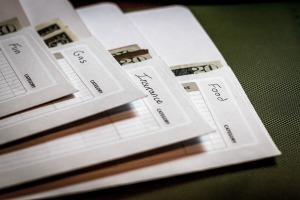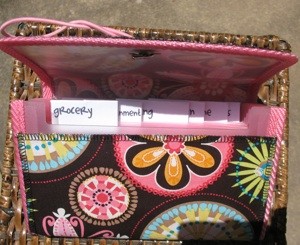
ThriftyFun is one of the longest running frugal living communities on the Internet. These are archives of older discussions.
Has any one ever used the envelope system for budgeting? I am now working one job and got behind on my bills. I just can't seem to hold on to my money. I am now getting paid bi-weekly. How can I start the envelope system and what amount should go into each of the envelopes till my next paycheck? Remember I only get paid bi-weekly. Thanks for your help.
By balbal from Boston, MA
If I remember it correctly the envelop system is very easy. You get several envelopes and on each one you right the name of a bill starting with the most important "must" pay bills, such as rent/mortgage, car payment, electric, water, sewer, etc. Things you must pay every month.
Next you make envelopes for "essential" items/bills, like groceries, medication, gas, etc. Things you "have" to have in order to stay healthy and to support the "must" pay list above.
Then you set aside envelopes for things you "like" to have each month. Things like eating out once a month. Coffee at work, an occasional soda, renting a movie, cable/satellite service. These are things you would like to have, but are not essential or must pay bills.
On each envelope you put the name of what it is for, the dollar amount and the due date. Put the envelopes in order by due date. Things that don't have a due date are slipped in where they will fit based on when you get your money and making sure that the bills get paid on time. If you have more due than you have money you may be able to get the due date moved. Call the company and ask. If not, you may have to pay something earlier than when it is due, maybe even before the due notice arrives.
The last thing is to have an envelope for savings. This envelope is important and off limits. You put money in and it never comes out unless you are going to lose something otherwise. It is good if you get a slightly larger envelope for this one so it doesn't bulge with the money you are saving. Some people say you should make a goal as to how much you want to save and to what end. You save up that much money and spend it as delegated. Then start over. I say if you fill the envelope up you seal it and start a new one.
Anyway, these are the basics of the envelope system. One variation is you leave your money in your bank account and write a check for each envelope. When you go to pay your bills the money is already in the bank, your check is already recorded in your registry and all you have to do is put it in your bill's envelope and mail it.
Good luck. (09/12/2010)
By Suntydt
We used the envelope method for a long time, until someone broke into our house and stole them. Now we keep the money in the bank, but keep the amounts in a separate ledger to keep track of the balances, deposits, and withdrawals. It's a great system! (09/15/2010)
By Coreen Hart
What might be easier for you is what I do. I get paid biweekly also. I divide my monthly bills by which bills are due the first half and which are due the second half. When I get paid, I pay bills according to due date. Only whatever is left is spent on food, entertainment, etc. I did not really include groceries as a budget item, but you could if you wanted to. Good luck. (09/15/2010)
By Cindy
My husband and I still do this, and we still have a bank account. The envelope system is really simple.
By Becca
I have tried to follow the envelope system, but I am still having a rough time with my money just blowing out of my hands with nothing to show for it. Will someone please give me some ideas as how to do a very basic budget, without a very long process and maybe how to set up the envelope system. Just a very basic system. This week when I get paid I want to not be blowing my money on stupid stuff and be able to have a little left in my pockets next payday. I just need some basic help.
Thank you,
Vallerie from Boston
For me to learn to budget, I was not young, but a single mom. I took envelopes and was paid 2 times a week so each paytime I put in the money 1/2 of what my bills were then when bill came due I had the money. I know some of you may not for sure know the amount so put in just a little extra of what you expect it may be. Do not take from these envelopes!
I was faithful for several years till I retired and always paid my bills on time. Sometimes I only had about 10 dollars to see me through payday to payday, but I made it (Praise God). I was even paying bills for my daughter at times. When I had direct deposit for awhile I had to go back to getting the check myself to get myself back on track with envelopes. This does work! Patience and obedience pays off. An envelope for each bill. (04/02/2007)
By Mary Ann
When I was working, one of the hardest things was for me to see where the money was going. There was never a problem paying bills, I grew up with not having bills paid on time all the time, and I was determined not to do this as an adult. The very first thing that is paid is bills. My problem is the rest of my money I would blow right through.
I started a journal of expenses and one thing I would do is write down where every penny went. I started seeing a dollar here, a dollar there. So when I was able to go a week without doing this, without having to add something useless to my journal, I knew I was getting somewhere. Because of disabilities my family and I are living on a small fixed income. So this is coming in handy. I don't know if this will help you, but seeing my expenditures, everyone of them, in writing helped me not to spend every dime. (04/02/2007)
By christi
Setting up a budget that works for you can be difficult, but it is definitely worth doing. I use the envelope system for bills, and mark on my wall calendar and cell phone calender when bills are due. Try not to use checking accounts, as they charge fees upon fees.
The most important question I ask myself when I go shopping with any leftover money is this: "Do I really "need" it, or do I just "want" it." That thought has saved me lots of $$$$ over the years. Good luck. (04/02/2007)
By lara
I don't know if you get paid weekly, fortnightly, or monthly. Set out an envelope for each bill you have coming in and write on each envelope, e.g.:
Etc., etc. Just use an envelope for each bill. Some of your bills could be monthly so to work out how much to put away weekly simply multiply the average monthly total x 12 (for a year's worth) then divide that year's total by 52, this will give you an idea how much to put in that envelope each week, write the weekly amount on the envelope also.
Some of your bills could be quarterly, so again, to work out how much to put away weekly, simply multiply the average quarterly total x 4 (for a year's worth) and then divide by 52 for a weekly total.. Don't forget to write your weekly "deposit" on the envelope.
If you get paid fortnightly instead, just double the weekly due amount and deposit that in the envelope and obviously if you're paid monthly you would "deposit" 4 weeks worth.
I hope I've explained everything simply enough and haven't confused you at all. Just take the time to ensure you've worked out all your bills and assigned an envelope for each one. It's worth the effort to get it all sorted. You could even make one for groceries, but I generally used whatever was left to buy groceries (and started economizing there also when I'd got my envelope system up and running!).
Also as someone else suggested, perhaps you could keep a note of unnecessary expenses so you can work out if there's anything you can cut back on until you get control of things. Good luck. (04/03/2007)
By jojo
Setting up a budget is easy, but you can make it hard if you think too much about it. (smile) Jot a list of your monthly expenses, for example, heat, rent or mortgage, car payment, insurances, etc. If your "needs" come out to be more than your "income", you need to look back and see what you can cut down on. For example, entertainment or clothing. Once you get bills paid off you will be able to buy more new clothes or whatever you've had to do without. Hope this is of some help.
(04/03/2007)
By Carol in PA
Look for more information at daveramsey.com. Basically, it will say to list all your monthly expenses, then reorder them in order of importance. This is the order they should be paid in. If your income is less than your expenses, look for areas where you can cut back.
I find it very helpful to use either checks or a debit card, "never" cash. I can then check my bank account online and see where I've spent money. If I have cash, it gets spent and I don't remember where it went. I usually spend cash on something stupid like a milkshake and fries. Some people say they tend to spend more when they use a card than when they use cash, but for me it is totally the opposite. When I carry cash, I don't carry it for very long, but I only take the time to write a check or poke in my pin for the debit card when I really need something. (04/03/2007)
By Allison
Keep a notebook with you, and every time you spend any money write down what you spent, and what you bought. Do that for a month, and you'll be amazed. At the end of each day, tally up what you've spent. In my case ( I should say my daughter's) her StarBuck's and Jamba Juice expenses really added up fast. The more you think about available cash and how it's being spent, the easier it is to manage.
Another idea is to ask yourself, "do I really need this, or is it something I can do without?" If it's something you can't live without, what will you give up to have it? It's not easy, you have a lot of work ahead of you, but the reward (more money for the vacation/new furniture/whatever) is well worth it! Good luck exercising your "won't power". (04/03/2007)
By Karen
This is something I started years ago, when single and continued all my life. It has worked well for me.
Monthly necessary bills:
#4 contains $ for clothes etc. personal things, #5 is your blow money or your spending money. Buy only what you can pay for (cash), do not charge things.
Sometimes it may mean walking to work, or beans, and no meats or brown bagging it, coupons, using the nite light instead of the big over head light. Save where you can to get that little extra you want. You will soon learn what is really necessary and what is an "at the moment thing" you think you cannot live without. Promise yourself to do this for 4 months in a row and see how it becomes a wise habit and you have the money to pay your bills and a growing balance in your bank account.
And please whatever you do, do not write out a check you don't have money in the bank to cover, and turn down the cash debit cards which gets Americans in so much trouble. Keep a current accurate check book with each check you write, you pay for what you get period (cash). No cash, no get. You may have to walk the extra mile to start and get on the budget, but once you have it, your on you way to being a millionaire. Take only with you a couple dollars at a time so your not spending it all at once. Opt for the ice lemon water instead of the latte.
Leave the burgers and fries alone now or you will soon wear them on your hips for years to come. Want proof, look around at super sized Americans, we are treating ourselves to death.
Today's millionaire is one who budgets and shops wisely, lives within ones means, does not waste, cuts costs where they can, and has money left from the weekly pay check growing.
It may mean working an extra hour or two when you can or getting a part time job for a few hours to earn that extra expense you think you have to have or to put it aside in another envelope for emergency spending. Just think, one who receives interest $ is much happier than one who pays out interest $. Living with in your means now, just may keep a roof over your head in the future. Go for it. Good luck and remember: No checks written, but for bills only!
It works, really does and soon you will reap the benefits of it. (02/02/2010)
By BD
This page contains the following solutions.
We started the "cash only" budget system last year. I didn't like using plain envelopes for cash - so I made my own. I started out using the fabric envelopes then moved to the folder style envelopes. both work so well for using cash rather than credit cards.
Happy budgeting!
By Cathy from Atlanta, Georgia
www.crunchycute.com (More of my projects)


 Credit cards have only been here since the middle of last century, for hundreds of years before it was cash, barter or credit balance payable at the end of each month in full (which most places don't do).
Credit cards have only been here since the middle of last century, for hundreds of years before it was cash, barter or credit balance payable at the end of each month in full (which most places don't do).
Spending cash hurts! Swiping a credit/debit card doesn't. If you have a 100 bill, it hurts to break it, not so with a $100 in the bank, sometimes you can even spend more of it than you have, then incurring more fees!
Try the old standby, the envelope system, for the things you can pay cash for. Gas station maybe not, but the grocery store, eating out (ridiculously overpriced and bad for you), coffee drinks, entertainment, etc. Set a budget of what you think you spend, or track your spending for a month. You'll be surprised. And when you do use cash, you'll be surprise how much you don't need that extra large coffee, another pair of black shoes or those Ding Dongs "on sale" at the grocery store.
I'm so excited about the envelope system, and how it's changed how much we keep each month. I bought a super cute wallet for my birthday that is the "envelope" system and a wallet all in one!
P.S. Please don't tell a frugal person your money woes if you spend it all before the next paycheck. Ask us for help, we might have some good ideas. No one makes you use that credit card or overdraw your bank account but YOU!
By Michawn from CA